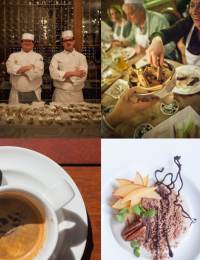
BE READY!
When a dish arrives at your table it will immediately start to fade. Use a stand-in plate to get all your lighting and camera angles set before the dish arrives.

LIGHTING
Try and get the lighting behind your dishes wherever possible. Whether shooting by a window or using an artificial light source, place it behind at about a 45-degree angle. This accentuates all the nooks and crannies, and gives texture to the dish.

CAMERA ANGLES
Look for more than one camera angle to photograph your food. In restaurants, chefs call the part of the dish that’s served facing the diner the “6 o’clock.” They believe that’s the most flattering view, and that’s certainly a good option to try. But don’t stop there—try an overhead angle, or shoot at the same level as the dish so the environment can be part of the photo. Be creative!

FOOD OR ART?
Ask yourself why you are taking the picture. Is it to capture the beauty of the dish or is it the beauty of the moment? Let that guide your artistic decisions.

USE FRESH INGREDIENTS
Obviously fresh ingredients are going to look—and taste—better in cooking. But they can also be used as props for a shoot. Don’t forget to bring your camera when you’re buying the ingredients. Markets are great places to capture your ingredients before they are used. Think about creating photo essays about your dishes from start to finish.

THINK ABOUT HOW THE IMAGE WILL BE USED
If you’re shooting for a client, always ask how the image will be used. Do you need a horizontal and a vertical? Will you need a large file for printing or just web use? Will it be a single image or will you be able to use multiple shots to tell the story?

WHO IS THE STAR?
We call the most important ingredient in a dish “The Hero.” It may be the main dish or a side vegetable. Whatever it is, make sure that’s where you draw the viewer’s gaze.

KNOW WHEN TO WALK AWAY
Let’s face it—some dishes just aren’t that pretty. If what you’re shooting falls into this category, try focusing on other aspects of the dish such as the ingredients or preparation.

BACKGROUNDS
The background can greatly alter the mood of the image you are creating. Try putting the dish on different surfaces—a cutting board, different-colored tablecloths, paper bags, the floor, etc. Be aware of how the background can match or contrast with colors in the food.

SAY NO TO YOUR CAMERA’S BUILT-IN FLASH
Many cameras today have a flash built into the body. Hopefully you can control this—and will never use it! The flash on top of your camera is in the worst possible position for a good picture. As we said in a previous tip, always try to get your light source behind your subject.
Do you want to get the perfect food shot? These tips will help everyone from the foodie Instagram-er to the up and coming food photographer. Learn about correct lighting, angles, and what backgrounds make food pop.
Written & Photos by Phil Mansfield
